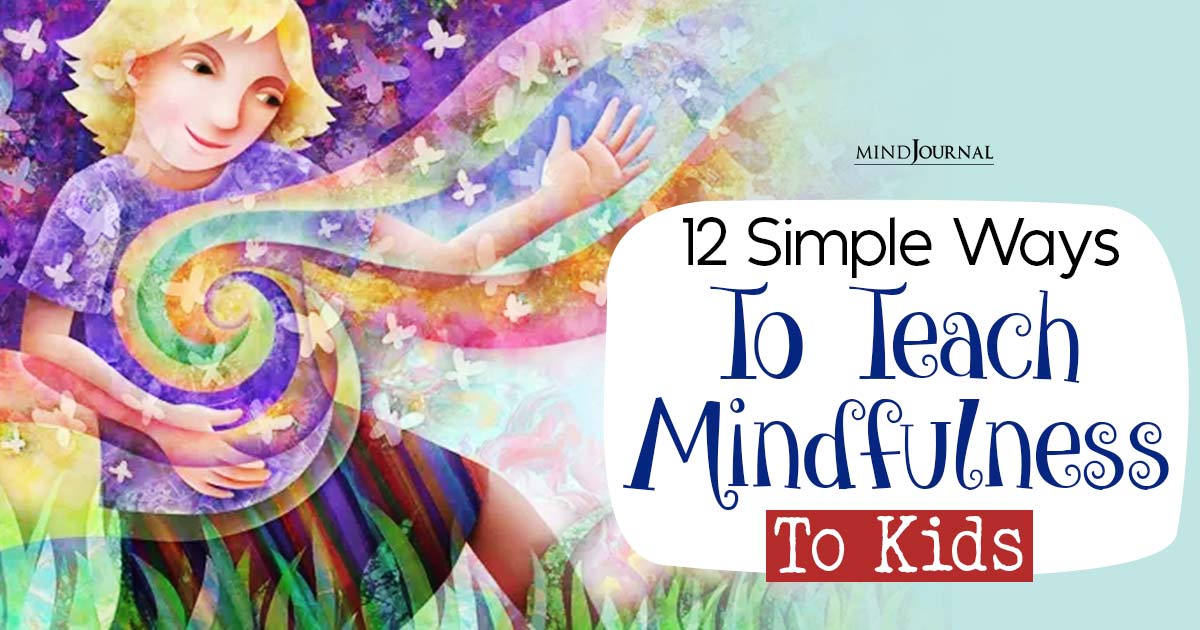If you are thinking about how to teach mindfulness to kids, then you have come to the right place. This post is going to explore the different ways to teach mindfulness to kids or how to teach mindfulness to a child, and the importance of mindfulness for kids. Let’s start, shall we?
12 Simple Ways To Teach Mindfulness To Kids
1. Notice and name body sensations, thoughts, and emotions.
“My chest feels warm and I feel so happy when we are playing outside together like this.” “It sounds like you might be nervous about this new situation. What do you notice in your body right now?”
The more insight our kids have into their inner experience, the more they are able to choose appropriate responses.
Related: 10 Creative Mindfulness Exercises For Kids
2. Enlist a guide
Some of my favorites are:
Kira Willey—Mindful Moments for Kids CD (30 simple, quick ways to help children de-stress, calm down, and focus), and her other fantastic musical yoga for kids CDs.
Carla Naumburg—Ready, Set, Breathe: Practicing Mindfulness with Your Children for Fewer Meltdowns and a More Peaceful Family
Eline Snel—Sitting Still Like a Frog: Mindfulness Exercises for Kids
Amy Saltzman—Still Quiet Place CDs for Children and for Teens
Thich Nhat Hanh—Planting Seeds: Practicing Mindfulness with Children
3. Share a 3-breath hug
Hugging your child, take three deliberate, synchronized, deep breaths together. Drop your shoulders, relaxing any muscles that feel tight. Let go and feel the tension melt away.
Use it as you say goodbye in the morning, when you recognize when someone could use a calming hug, or just for the love of it.
4. Move, stretch, and notice body sensations.
Teach your children to observe and appreciate all that our bodies are capable of and do for us.

5. Stop and be aware of the surroundings.
Whenever you find yourself waiting with a spare moment— in the grocery checkout line, at a doctor’s appointment, or walking to your car—pause, tune into the five senses, and share what you notice with one another.
Related: 13 Best Mindfulness Meditation Videos For Kids
6. Describe your own process of noticing, naming, and using the breath to calm yourself
“Wow, I am feeling overwhelmed right now. I need to walk away and take a few deep breaths… Whew, okay, now I feel calmer.”
7. Eat a mindful snack
If you have a toddler, this may come easily, as toddlers often eat at an excruciatingly slow pace. As kids grow older, they may need a reminder to slow down.
Together, use your senses to observe the food. Enjoy the first few bites with careful attention to appearance, scent, feel, and taste.
8. Count the breaths
Either lying down with a small pillow or stuffed animal on your child’s belly or sitting up with a hand resting on the belly, notice the inhale and exhale, the rising and falling of the belly. Count the inhales and the exhales, at first out loud, then silently on your own.
9. Take a mindful nature walk
Move at your child’s speed, which, of course, can vary from sprinting like a cheetah to slugging along at a snail’s pace.
Bring your sense of curiosity and adventure and allow your child to lead the way.

10. Practice belly breathing
Place one hand on the chest and one on the belly. As you inhale, fill up the belly like a balloon and as you exhale, allow the balloon to deflate.
This often feels counterintuitive at first, as most of us breathe shallowly into the chest most of the time. Belly breathing automatically turns on the relaxation response in the body.
Related: Conscious Parenting: The Art Of Raising Happy Children
11. Let them be
Kids are instinctively more mindful (which is why it can take them so bleeping long to get from point A to point B).
Whenever possible, allow them to explore at their own pace. Create space in your schedule for free time to investigate and be mindful naturally.
12. Teach by example
You are modeling mindfulness for your children, right? (Read more about the importance of your own practice here.)
As with all new information, we learn best when we are in a calm state of mind. As Carla Naumburg writes in Ready, Set, Breathe, “You can’t practice crisis meditation.”
The more you infuse your lives naturally with mindfulness, the more apt you and your children will be to use it when things get stressful.
Whatever you do, don’t force. As children develop and change, so will the most suitable forms of mindfulness. Be patient and have fun. Take the long, slow road whenever possible.
Mindfulness, after all, is a way of being meant to be cultivated over a lifetime. So go ahead and breathe.
Check out Shonda Moralis’s 1-1 Life Balance Coaching here. You can also check out her amazing books here.
Written By Shonda Moralis MSW, LCSW Originally Appeared On Psychology Today










Leave a Reply